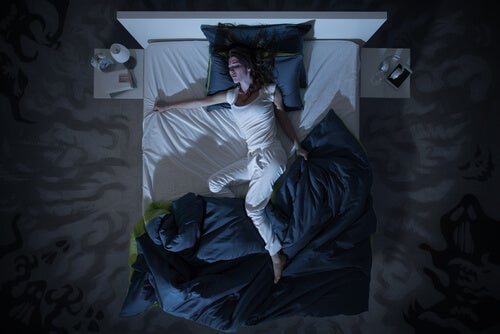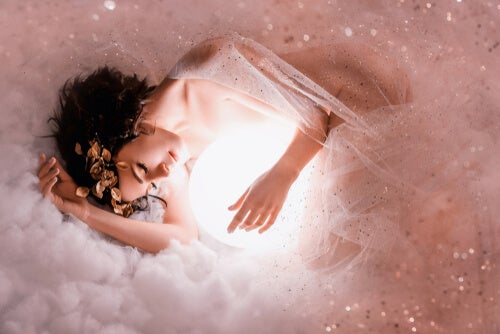Incubi and succubi are spectral entities that, since time immemorial, have appeared in the myths and legends of various cultures. These beings manifest during the night, while we sleep. They can paralyze, touch, or seize their victim, who’s left to witness the event, unarmed.
It must be said that not all incubi and succubi experiences are terrifying. In fact, incredible as it may seem, these spirits of the night can even cause ecstasy in some people. However, this is unusual. As a matter of fact, to a certain extent, the experience depends on the sex of the victim.
Incubi and succubi: the ghosts of sleep
During the Middle Ages, legends were taken extremely seriously and this one was no exception. Everyone at that time seemed to know someone who’d been through the experience (we’ll describe it later) Incubi and succubi were considered to be of demonic origin and people tried to combat them through exorcisms, amulets, holy water, crucifixes, etc.
The presence of one of these spirits was always a bad omen. It tended to predict some kind of misfortune, such as an illness, or the death of a loved one or the individual who had the experience. In addition, as we mentioned earlier, the experience varied, depending on the gender of the victim.
- Women were affected by the incubi. They often sat on their chest, preventing them from moving and causing them nightmares. On some occasions, they even impregnated them, which meant the women gave birth to new monsters.
- Men were assaulted by the succubi, female demons that seduced them while they were asleep.
The episodes described above form part of the legend of the incubi and succubi. However, today they’re taken as a basis to explain phenomena that actually occur during sleep. Let’s look at this in more detail.
Incubi: night terrors
Today, incubi are associated with night terrors. They’re characterized by sudden episodes of awakening in the middle of the night, usually preceded by a cry of anguish and followed by intense anxiety and agitation. The victim can’t remember what’s happened and they experience total amnesia about the event. It takes them between a few minutes to a few hours to calm down, orient themselves, and reconnect with their environment, or to go back to sleep.
This disorder occurs during the phases of deep sleep or NREM. It can be concluded that the individuals weren’t dreaming, nor can they remember the reason for their nocturnal anguish. Some psychoanalysts believe that it’s an episode of self-punishment for a reprehensible dream. However, this hypothesis has been completely ruled out by science.

The succubi: nocturnal emissions in men
The legend of the succubi offers a supernatural explanation for the nocturnal emissions (wet dreams)and erections experienced by men. The word, succubus comes from Latin and means prostitute. The succubi come at night, while men sleep, seduce them in their dreams, and have sex with them. Therefore, it’s said to be due to these fictitious intimate relationships, that men ejaculate while they’re asleep.
Occasionally, a man will report having felt themselves being touched and kissed and thinks that the sexual relationship was real, including coitus. However, minutes or hours after waking, they only remember the dream in fragments and it’s shrouded in mist.
Some Jungian authors have pointed out that the encounter with the succubus is nothing more than an encounter with the anima (the projection of the idealized feminine image in the psyche of man). This would explain why the relationship with the succubus or the anima is incredibly pleasant.
Lilith: one of the most famous succubi
Lilith or Lilit is a figure from Mesopotamian mythology and Jewish demonological folklore who embodied evil beauty and passionate sexual relations. You can read about her in historical texts like the Bible or the Epic of Gilgamesh. She’s traditionally considered to be a femme fatale, as she leads men to eternal damnation.
According to the Hebrew myth, Lilith represents equality with man, since, unlike Eve, she was created equal to Adam. Since she was the same as her partner, she rebelled against his demands for submission and left him. She took other lovers and had many children.
Therefore, Lileth was the first free woman in history and is traditionally considered an early figure of feminism.
Incubi and succubi: a scientific explanation
Today, understandably, many people don’t believe that incubi and succubi exist. In fact, they consider that they’re simply products of the imagination of certain individuals. However, there are certain people who really believe that they’re attacked when they’re asleep and assume they’re a real phenomenon. In these cases, science proposes a condition known as sleep paralysis.
Imagine that you wake up, but you can’t move. You’re able to hear and perceive what’s happening around you, but you can’t react. This is what happens to people who suffer from sleep paralysis, a rare and distressing disease. Fortunately, the episodes subside after a few minutes.
This situation can also occur when the individual is trying to fall asleep and can be triggered by stressful situations, a previous lack of rest, or abnormal sleep cycles.
Explanations
Science hasn’t yet been able to clarify exactly what happens in the body for this to happen. One theory proposes that the phase of the REM sleep cycle overlaps the wake phase, thus causing the symptoms.
However, the way in which this phenomenon is perceived varies depending on the beliefs of each individual and the culture to which they belong. Superstitious people may attribute it to incubi and succubi or spirits. For example, Muslims attribute it to demonic entities called djinns. Therefore, we can confidently state that sleep paralysis takes on different forms depending on who experiences it.
To conclude, although much of these phenomena have already been fully explained by science, they remain wrapped in a mystical halo that makes them seem extremely fascinating. On the other hand, these sensations and syndromes can also be a part of other disorders, such as dementia or psychosis.
The post Incubi and Succubi: The Ghosts of Sleep appeared first on Exploring your mind.



















Comments